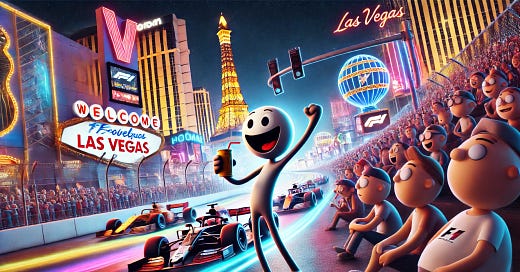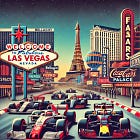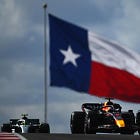As I prep to head out to Vegas in a couple of weeks to attend the Las Vegas Grand Prix, I’ll be posting more about my thoughts on what’s going on around the city and how Formula 1 plans to transform the experience. If you’re going to be there, feel free to DM me here or on Twitter/X.
It’s a balmy Sunday morning, and I’m watching an NFL game between the Giants and Panthers being played in Germany, a game I have zero rooting interest in, I’m getting pretty excited about going to the Las Vegas Grand Prix in 10 days.
And so it got me thinking. Everyone spent last year debating whether F1 could work in Vegas.
Turns out, we might have been asking the wrong question.
The real story isn't about whether Vegas should host F1. It's about how Vegas fundamentally changed what an F1 race weekend could be.
Here's what keeps rolling around in my head: Back in 2016, COTA took a gamble by booking Taylor Swift after qualifying. Added 80,000 people and $15 million in ticket sales. Simple enough idea.
But Vegas? Vegas looked at that and thought, "Cute. Hold my beer."
The numbers from last year are staggering - $1.5 billion economic impact, 315,000 attendees, generating $77 million in tax revenue - the highest in Las Vegas history. But raw numbers miss the bigger play. Vegas didn't just supersize COTA's concert idea. They turned the entire Strip into a three-day festival where the race almost feels like a bonus feature.
It's funny - seven years ago, this city couldn't get the NFL to accept an ad during the Super Bowl. Now look: Golden Knights with a Stanley Cup, Aces going back-to-back in the WNBA, Raiders settling in, MLB's Athletics on the way, and yes, the Super Bowl happened here in February. F1 wasn't rolling into a sports desert. They were joining a carefully orchestrated revolution.
That's what keeps striking me about this weekend. The race isn't trying to be Monaco or Silverstone. It's not even trying to be Miami. Vegas took one look at traditional race weekends and said, "Yeah, we're doing something else entirely."
Consider the Sphere.
A $2.3 billion LED orb that's become as crucial to race weekend as the paddock itself. Dana White’s UFC knows how impressive it is, so he booked it for fights. The F1 infrastructure has become part of the city's permanent entertainment arsenal.
While F1 invested $88 million in public infrastructure and generated $52 million in local worker wages, there were significant growing pains. The event faced challenges with utilities and hospitality planning, and some local businesses were negatively impacted, particularly in areas like West Harmon. But here's what I keep coming back to: not only did Vegas host an F1 race, they created a template that makes every other race weekend look timid by comparison.
Makes you wonder about those traditional European races. They've got the heritage, the history, the pure racing culture. But Vegas showed you can respect the sport while completely reimagining how people experience it.
I can't help thinking this is bigger than just F1. Every sports property is wrestling with the same questions: How do you justify higher ticket prices? How do you attract younger fans? How do you compete with infinite entertainment options?
Vegas's answer? Stop selling just a sport. Sell a weekend that makes people forget they're spending three months' rent to be there.
Looking ahead to 2024, the event is being strategically scaled back with fewer musical acts and a reduced budget. The expected economic impact will be around $250 million - a significant adjustment from the inaugural year.
Looking at the preparations today, I'm struck by how obvious it all seems now. Of course Las Vegas would reinvent F1 race weekends. That's what this city does - takes familiar experiences and dials them up until they're barely recognizable.
The house always wins, as they say. But this time, so does everyone else.








